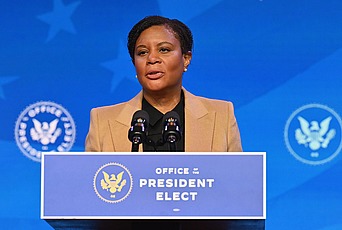Alondra Nelson Appointed to Perform Duties of OSTP Director
Press Contact

Alondra Nelson, Harold F. Linder Professor in the School of Social Science at the Institute for Advanced Study, has been appointed by President Joe Biden to perform the duties of director of the White House Office of Science and Technology Policy (OSTP) and as Deputy Assistant to the President. Dr. Francis Collins has been appointed to perform the duties of Science Advisor to the President and Co-Chair of the President’s Council of Advisors on Science and Technology. Both are to serve until permanent leadership is nominated and confirmed. According to the White House press release, “These appointments will allow OSTP and the President’s Science and Technology agenda to move seamlessly forward under proven leadership.”
Nelson will continue to serve as Deputy Director of Science and Society of OSTP. As a sociologist, Nelson brings social science expertise explicitly into the work of federal science and technology strategy and policy.
“Alondra’s assumption of this role, so critical for our nation’s future, is testimony to her spectacular achievements as a scholar and her inspirational leadership across fields,” said David Nirenberg, IAS Director and Leon Levy Professor. “She brings to the office a keen awareness of the ways in which social science can enrich and transform science policy. We will all benefit from this historic appointment and celebrate Alondra as she continues the tradition of IAS faculty who have contributed to both discipline and nation at the highest levels.”
Nelson’s major research contributions are situated at the intersection of racial formation and social citizenship, on the one hand, and emerging scientific and technological phenomena, on the other. She is the author of The Social Life of DNA: Race, Reparations, and Reconciliation after the Genome. Her books also include Body and Soul: The Black Panther Party and the Fight against Medical Discrimination, as well as Genetics and the Unsettled Past: The Collision of DNA, Race, and History (with Keith Wailoo and Catherine Lee), and Technicolor: Race, Technology, and Everyday Life (with Thuy Linh Tu).
Nelson received a B.A. from the University of California at San Diego and an M.Phil. and Ph.D. from New York University. In addition to her position at IAS, Nelson previously served as President of the Social Science Research Council and Dean of Social Science and Professor of Sociology at Columbia University. In her early career, Nelson was an assistant professor of African American Studies and Sociology at Yale. She is an elected member of the American Academy of Arts and Sciences, the American Philosophical Society, and the National Academy of Medicine.
The OSTP, an agency within the Executive Office of the President established in 1976, has a threefold mission: first, to provide the President and his senior staff with accurate, relevant, and timely scientific and technical advice on all matters of consequence; second, to ensure that the policies of the Executive Branch are informed by sound science; and third, to ensure that the scientific and technical work of the Executive Branch is properly coordinated so as to provide the greatest benefit to society.
About the Institute
The Institute for Advanced Study, founded in 1930, is one of the world’s foremost centers for theoretical research and intellectual inquiry. Located in Princeton, NJ, the IAS is dedicated to independent study across the sciences and humanities and to advancing the frontiers of knowledge without concern for immediate application. From founding IAS Professor Albert Einstein to the foremost thinkers of today, the IAS enables bold, curiosity-driven innovation to enrich society in unexpected ways.
Each year, the Institute welcomes more than 200 of the world’s most promising post-doctoral researchers and scholars who are selected and mentored by a permanent Faculty, each of whom are preeminent leaders in their fields. Among present and past Faculty and Members there have been 35 Nobel Laureates, 42 of the 60 Fields Medalists, and 21 of the 24 Abel Prize Laureates, as well as many MacArthur Fellows and Wolf Prize winners.


